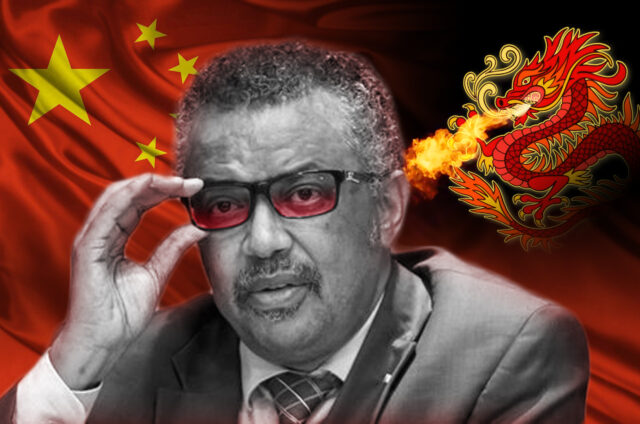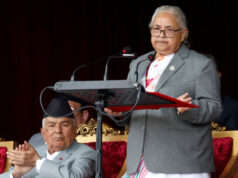NEW DELHI: COVID-19, or more appropriately the Chinese virus, has thrust one man into the world spotlight: Tedros Adhanom Ghebreyesus or more simply Tedros, as he prefers to be known. Appointed in May 2017, Tedros who is the eighth director general (DG) of the WHO, has an unenviable task before him – dealing with what is one of the greatest modern-day crises facing humanity today.
While some have lauded the man for responding in a “robust” and “responsible” manner, a little digging into his background reveals anything but. The reason for that can be summarised in one word: Beijing. As critics point out, Tedros’s close ties with China blinded him to the seriousness of the crisis, an error the entire world is paying for today.
Controversial Figure
Through his career, Tedros has remained a controversial figure. A former health and foreign minister of Ethiopia, Tedros belongs to the Tigray People’s Liberation Front (TPLF), which has been accused of human rights abuses in the country. The outrage among Ethiopians was so high that several members of the Ethiopian diaspora protested outside the WHO’s headquarters even as he was being selected and elected.
Human rights aside, let’s come to matters to health. According to the New York Times Tedros was accused of covering up at least three cholera epidemics when he was health minister. When questioned on this, he retorted that his accusers had a “colonial mindset.”
Tedros’s China Connection
But what remains most interesting is the WHO DG’s China connection. While he was minister, Tedros ensured that his country remained at the mercy of Chinese business and investment. As a Facebook post of his dated four years ago revealed most tellingly, “Under the “Go Global” program of #China, we expect increased Chinese investment flow to #Ethiopia . The 8 industrial parks identified throughout #Ethiopia, some already under construction, will facilitate the migration of Chinese companies to #Ethiopia.” The post summed it up: Tedros was Beijing’s man.
The China relationship continued post Tedros’s ministership as Beijing lobbied hard to get Tedros the coveted post of director-general of the WHO. As British journalist Rebecca Myers pointed out in an article in the Sunday Times in October 2017 “Beijing’s financial clout and opaque aid budget was used to build support for him among developing nations.” The victory for Tedros not only cemented China’s ties with African nations but also was a source of pride for China’s President Xi, as it underscored Beijing’s clout. But more important, Tedros was expected to return the favour which he soon did.
Payback Time
The WHO DG immediately got to work to repay China. His bid, later withdrawn, to appoint late Zimbabwean dictator Robert Mugabe as the UN Goodwill Ambassador in October 2017 was a step in this direction. It was a win-win situation for both Tedros and Beijing. At the time of Tedros’s appointment, Mugabe was the head of the African Union (AU) bloc which had endorsed him, and Tedros needed to repay the favour. Mugabe too was an important man for Beijing. China-Zimbabwe ties had prospered under the late dictator to the extent that President Xi, in a trip to the country in 2015 had called Zimbabwe an “all weather friend.” India, Indians and the world at large will be only too aware of what that means.
Part of the China narrative
This by now well-established China connection explains Tedros’s hurried bid to give China a pat on the back in its handling of the pandemic. Despite China’s now very well-known silencing of whistleblower Li Wenliang who had raised concerns about an unknown virus in early December, Tedros was in a hurry to exonerate Beijing. “China is actually setting a new standard for outbreak response,” he said in a statement on January 30. But what emerged later was something quite different. According to the New York Times seven million people left Wuhan in January, spreading the virus all over China and over the world, before China finally restricted travel to Wuhan on January 22.
Prior to this too, the WHO had also endorsed China’s contentions now found to be false. “Preliminary investigations conducted by the Chinese authorities have found no clear evidence of human-to-human transmission of the novel #coronavirus (2019-nCoV) identified in #Wuhan, #China,” the WHO had tweeted on Jan. 14. This complacency, lack of action and urgency cost the world valuable time in which to tackle the Chinese virus. According to some studies, if the world had had this time several lives could have been saved.
Looking Beyond Tedros
With the pandemic having slid out of control, Beijing has now needed to go beyond the ambit of Tedros and the WHO. This is not to imply Tedros is of no further use. All signs point to a growing backlash against China, and Beijing will need the services of people (like Tedros?) who are seen to have served it well in the past.





